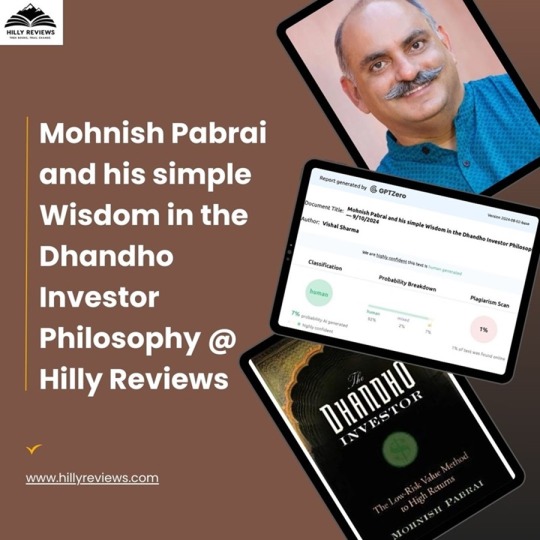#Mohnish Pabrai
Explore tagged Tumblr posts
Text
Mohnish Pabrai and his simple Wisdom in the Dhandho Investor Philosophy @ Hilly Reviews

Dhandho, which literally translates to "business" in Gujarati, literally means "endeavours that create wealth." However, Mohnish Pabrai clarifies his low-risk, high-return business strategy in a more constrained manner. Dhandho is an extremely risk-averse and cautious investing philosophy. Saving money is the primary objective, followed by expanding non fiction books sales by identifying equities and businesses where you may minimize losses while still having a high chance of making a profit by purchasing them at a discount to fair market value.
#hillyreviews#bookreview#book reviews#fiction books#famous book reviews#book review book#literature reviews#Mohnish Pabrai#Dhandho Investor
0 notes
Photo

Mistakes are the best teachers. One does not learn from success. It is desirable to learn vicariously from other people's failures, but it gets much more firmly seared in when they are your own. Mohnish Pabrai
0 notes
Text
Top 10 Books For Stock Market Beginners In India

Investing in the stock market can be an intimidating try, especially for beginners. However, with the right guidance, anyone can learn the basics of stock trading. They can also learn about investment. Books are one of the best resources for gaining a thorough understanding of the stock market. Here is a list of the top 10 books that are highly recommended for stock market beginners in India. Top 10 Books For Stock Market Beginners In India 1. "The Intelligent Investor" by Benjamin Graham It is often called the Bible of investing. "The Intelligent Investor" is a must-read. It is for anyone seeking to understand the stock market. Many successful investors follow Benjamin Graham's value investing philosophy. It has influenced them, including Warren Buffett. The book says that long-term strategies are important. It also says that research is needed before investing. 2. "One Up On Wall Street" by Peter Lynch Among the most successful fund managers was Peter Lynch. He shares his insights and strategies in this classic book. Lynch argues that people can succeed by using their daily experiences and observations. They can use these to find good investments. The book is full of practical advice. The engaging style makes it easy for beginners to understand. 3. "Common Stocks and Uncommon Profits" by Philip Fisher Philip Fisher's book is a treasure trove of investment wisdom. It focuses on qualitative factors for investing in stocks. These include the quality of management and the company's growth potential. Fisher's "15 Points to Look for in a Common Stock" is an essential checklist for any investor. 4. "Rich Dad Poor Dad" by Robert Kiyosaki The book is not only about stock market investing. "Rich Dad Poor Dad" gives valuable lessons. They are on financial literacy and investing. Kiyosaki's compares his "rich dad" and "poor dad". This offers insights into their different attitudes towards money and investing. The book challenges readers' preconceived notions about money. It urges them to seek financial independence through smart investments. 5. "The Warren Buffett Way" by Robert G. Hagstrom This book offers a deep look at Warren Buffett's investment strategies. He is one of the most successful investors of all time. Hagstrom breaks down Buffett's approach to investing. It includes his focus on companies with an edge. He also emphasizes long-term investments. The book is both informative and inspirational for beginners. 6. "How to Make Money in Stocks" by William J. O'Neil William O'Neil founded Investor's Business Daily. He shares his CAN SLIM strategy for picking winning stocks. The book provides a comprehensive guide to stock selection, timing, and risk management. It also has many case studies and charts. They help readers understand the concepts. 7. "The Little Book That Still Beats the Market" by Joel Greenblatt Joel Greenblatt simplifies stock investing. He does this with his "Magic Formula." It focuses on buying good companies at bargain prices. The book is short and easy to read, making it ideal for beginners. Greenblatt's methodical approach to investing is both logical and practical. 8. "Stocks to Riches: Insights on Investor Behaviour" by Parag Parikh This book is tailored specifically for Indian investors. Parag Parikh explores the psychology of investing. He looks at common biases that can lead to bad decisions. The book combines ideas from behavioral finance. It also has practical advice on stock market investing in India. 9. "Learn to Earn" by Peter Lynch and John Rothchild The book is for beginners and young investors. It provides an intro to the stock market and the importance of investing. Lynch and Rothchild explain the basics of how the stock market works. They cover the history of investing and how to find good investments. The book is educational and written in a straightforward, easy-to-understand style. 10. "The Dhandho Investor" by Mohnish Pabrai Mohnish Pabrai is a successful investor with Indian roots. He presents his investment philosophy in "The Dhandho Investor." The book focuses on a value investing approach inspired by the principles of Dhandho. Dhandho is a Gujarati word meaning business. Pabrai illustrates his strategy with real-world examples, emphasizing low-risk, high-return investments. Conclusion These ten books provide a complete foundation. They are for anyone looking to start investing in stocks. They cover many topics. These include basic analysis, investing, behavioral finance, and personal finance. By reading and using the lessons from these books. Beginners can gain the knowledge and confidence to navigate the stock market. These books offer valuable insights. They can help you reach your financial goals. They are for people who want to understand the basics or learn advanced strategies. Read the full article
0 notes
Text
Cartea care te poarta intr-o calatorie fascinanta in mintea celor mai mari investitori ai lumii: Mai bogat, mai intelept, mai fericit
În era noastră, când totul se întâmplă într-un ritm trepidant, iar schimbările economice apar tot mai rapid, educația financiară devine din ce în ce mai necesară. Cărțile din sfera aceasta reprezintă un instrument indispensabil în dezvoltarea personală și profesională a oamenilor, oferindu-ne cunoștințe importante și abilități practice pentru a naviga în această lume financiară complexă.
Cartea Mai bogat, mai înțelept, mai fericit: Cum câștigă cei mai mari investitori ai lumii pe piețele financiare și în viață, de William Green, oferă o privire aprofundată asupra strategiilor și filosofiilor de viață ale unora dintre cei mai remarcabili investitori ai lumii. William Green, autorul cărții, un jurnalist de renume cu o vastă experiență în domeniul financiar, a intervievat peste 40 de investitori de elită, dezvăluind nu doar secretele investițiilor lor, ci și lecțiile prețioase pe care le-au învățat în viața de zi cu zi.

Autorul dezvăluie aspecte mai puțin cunoscute ale vieții și carierei acestor titani financiari, oferind cititorilor o perspectivă unică asupra modului în care aceștia și-au gestionat nu doar portofoliile, ci și aspectele personale ale vieții. Cartea explorează teme precum gestionarea timpului, crearea unui mediu propice pentru reflecție, selectarea relațiilor interumane, evitarea prejudecăților, gestionarea stresului și a problemelor, precum și modul în care acești investitori remarcabili își cheltuiesc și își donează averile pentru a-și construi o viață plină de sens.
Pe parcursul cărții, cititorii vor descoperi povești fascinante despre personalități precum Charlie Munger, Mohnish Pabrai, Sir John Templeton, Howard Marks, Jean-Marie Eveillard, Bill Miller, Laura Geritz sau Joel Greenblatt. Aceste relatări aduc în prim-plan nu doar succesele financiare, ci și detaliile care stau în spatele lor, oferind inspirație și provocări pentru o viață mai împlinită și mai fericită.
William Green, cu o bogată carieră în jurnalism și colaborări cu publicații precum The New Yorker, Time, Fortune și Forbes, aduce prin intermediul acestei cărți o perspectivă autentică și bine documentată. El a lucrat îndeaproape cu personalități precum Guy Spier și a contribuit la volume notabile în domeniul investițiilor.
Mai bogat, mai înțelept, mai fericit este împărțită în opt capitole, fiecare aducând în prim-plan un alt aspect al vieții și al strategiilor investiționale ale acestor mentori financiari, și reprezintă o lectură obligatorie pentru toți cei interesați să înțeleagă nu doar secretele financiare ale investitorilor de succes, ci și modul în care aceștia își construiesc viața în afara piețelor financiare.
ap! (ACT și Politon) crede în dezvoltarea continuă și aduce cititorilor români titluri care acoperă o gamă variată de subiecte din sfere precum dezvoltare personală și profesională, antreprenoriat, spiritualitate și wellbeing, oferind iubitorilor de carte posibilitatea de a citi sau a asculta cărți, de a le folosi pe post de profesori sau sfătuitori și de a transforma clipele de relaxare într-un timp calitativ.
0 notes
Text
Once you have a sense that life is meaningless, what should you do? Not fuck up life for other people. Leave the planet a better place than you found it. Do a good job with your kids. The rest of it is a game. It doesn’t matter.
—Mohnish Pabrai, Investor
1 note
·
View note
Text
Mohnish Pabrai’s Portfolio: Insights into Successful Investments

Investing in the stock market can be challenging, but some individuals consistently achieve remarkable success. One such person is Mohnish Pabrai, an Indian-American investor known for his investment prowess. In this blog, we will explore Mohnish Pabrai’s portfolio and learn from the strategies that have contributed to his remarkable success.
Value Investing Philosophy: Pabrai follows the value investing philosophy, focusing on undervalued companies with strong fundamentals and long-term growth potential. He believes patience and a contrarian approach are essential for exceptional returns.
Cloning Investments: Pabrai employs a cloning strategy by closely following successful investors and replicating their investment ideas. By studying their decisions, he aims to benefit from their research and analysis, increasing his chances of finding profitable opportunities.
Concentrated Portfolio: Pabrai maintains a concentrated portfolio, focusing on a small number of high-conviction investments. By thoroughly researching and understanding these companies, he aims to capitalize on his best ideas and potentially generate higher returns.
Contrarian Investing: Pabrai invests in industries and companies that are out of favour or facing temporary challenges. He believes market inefficiencies and fear-driven behaviour create opportunities to buy excellent businesses at discounted prices. This contrarian approach allows him to profit from their potential recovery.
Long-Term Investment Horizon: Pabrai emphasizes having a long-term investment horizon. He patiently holds onto investments for extended periods to realize their full potential. This approach requires withstanding short-term volatility and focusing on the long-term growth prospects of chosen companies.
Risk Management: While seeking profitable opportunities, Pabrai also emphasizes managing risk. He conducts thorough due diligence and evaluates downside risks before investing. Preserving capital is as crucial as generating returns, and he is willing to walk away from potential investments if the risk-reward ratio is unfavourable.
Conclusion:
Mohnish Pabrai portfolio provides valuable insights into successful investments. His adherence to value investing principles, cloning successful investors, concentration in high-conviction investments, contrarian approach, long-term horizon, and emphasis on risk management have contributed to his remarkable track record. By studying and understanding strategies like Pabrai’s, we can enhance our own investment decision-making processes.
Remember, successful investing requires discipline, patience, and independent thinking in the face of market trends.
0 notes
Text
Notes from the book "The Dhandho Investor"
Notes from the book “The Dhandho Investor”
Summarized Dhandho framework • Invest in existing businesses.• Invest in simple businesses.• Invest in distressed businesses in distressed industries.• Invest in businesses with durable moats.• Few bets, big bets, and infrequent bets.• Fixate on arbitrage.• Margin of safety—always.• Invest in low-risk, high-uncertainty businesses.• Invest in the copycats rather than the innovators
View On WordPress
0 notes
Link
#Mohnish Pabrai Portfolio.#Sunteck Realty Ltd#Edelweiss Financial Services Ltd#Rain Industries Ltd#Kolte-Patil Developers Ltd#Kaveri Seed Company Ltd#Mohnish Pabrai
0 notes
Link
0 notes
Link

#Mohnish Pabrai Portfolio#Kaveri Seed Company Limited#Rain Industries Limited#Kolte-Patil Developers Limited#Sunteck Realty Limited#Edelweiss Financial Services Limited
0 notes
Text
Mohnish Pabrai and his simple Wisdom in the Dhandho Investor Philosophy @ Hilly Reviews

Simply put, Mohnish Pabrai's methods—what he terms the Dhandho mindset—show that you don't have to place extremely hazardous wagers in order to make money. It's about holding onto what you have and allowing it to gradually expand. Novel books that are not fiction Pabrai waits patiently for his money to increase rather than chasing the latest, trendy stock. Perhaps, though, simplicity is the key. There are instances when the simplest plan works best. Your money grows, albeit slowly, and you get better sleep.
#hillyreviews#fiction books#book reviews#book review book#famous book reviews#story book review#literature reviews#book review#non fiction books#novels to read#readable books
0 notes
Link
Mohnish Pabrai worked in R&D at Tellabs after graduating. In 1991, he established his own IT consulting firm, TransTech, Inc., which was a success. In 1999, he launched the Pabrai Financial Funds, based on the investment concepts he learned from Warren Buffet. Check out the latest Mohnish Pabrai portfolio and holdings as per the latest Exchange filings.
0 notes
Text
5 Types of businesses which can become a multibagger-Mohnish pabrai
The blog is based on the lecture given by Mohnish Pabrai
http://sahilsthought.blogspot.com/2020/07/5-types-of-businesses-which-can-become.html
1 note
·
View note
Text
“Entrepreneurs Are Great At Dealing With Uncertainty And Also Very Good At Minimizing Risk. That’s The Classic Entrepreneur.” – Mohnish Pabrai
1 note
·
View note
Text
Mohnish Pabrai: Promised land
“There’s a saying…’Take a simple idea and take it seriously.’ And I think that’s a really important thing to keep in mind. And I think when you look at lots and lots of extremely successful people right at the pinnacle of their careers, when you break it down, that quote is at the epicenter of how they got there. Usually it’s not something earth-shattering. Usually it’s something very simple, but…
View On WordPress
0 notes
Text
Key Aspects to Consider While Making Investment Decisions
It is quite natural that people prefer to access maximum returns on their investment. But making investments has its own risks, even though risk is an inherent element involved in making every investment decision. Though, there are risks, there are remedies as well. So, getting to know of some crucial points about Mohnish Pabrai Investments can avoid mishaps and ensure investment a fruitful one.
Realistic expectation
Expecting your money to be doubled within a month can be too ambitious or as if you are living in an imaginary world. So, being a successful investor, you need to be patient, a prudent thinker and a continuous learner. To start with, 10 to 15% return on your investment is enough to be a successful investor. But, the only thing, you must ensure is that the return must be continuous process, year after year as in the case of Mohnish Pabrai Investments.
Evaluate the financial product before making an investment
Before making an investment in Pabrai Funds or in any stock, for instance, it is very important to analyze the business in which you are investing in, because when you buy a stock, it is your share in the ownership of that firm. Also, your future relies on the company's future and company's future performances and projects. So, it is a must for every investor to analyze the stock before investing. In other words, as an investor, you must carry out Stock Analysis before making the investment. Two well-known methods of stock analysis are:
Fundamental Analysis- It is done by using actual data to assess a stock. This method includes measuring the intrinsic value of the stock by analyzing the relevant financial as well as economic factors. It is the strategy to understand each and every factor, which can impact the business such as the overall economy, financial conditions and management of the company. Thus, for long term investors, undertaking the fundamental analysis is advantageous.
Technical Analysis- This process works on the notion that the clue to the future performance of the stock depends on the past performance of the stock as well as the market. This method includes analyzing the data and figures produced by market activities. Also, charts and other tools are made use of to identify the patterns in order to forecast the future activities. The stock analysis method is advantageous for short term investors.
Adhere to the margin of safety
In spite of choosing your stocks with utmost care; things can go wrong. By using Margin of Safety helps in mitigating the losses to a considerable extent. In fact, it is the difference between the intrinsic value and the market price of a stock and helps to safe guard your investment Pabrai Funds from experiencing downturns in the market.
0 notes